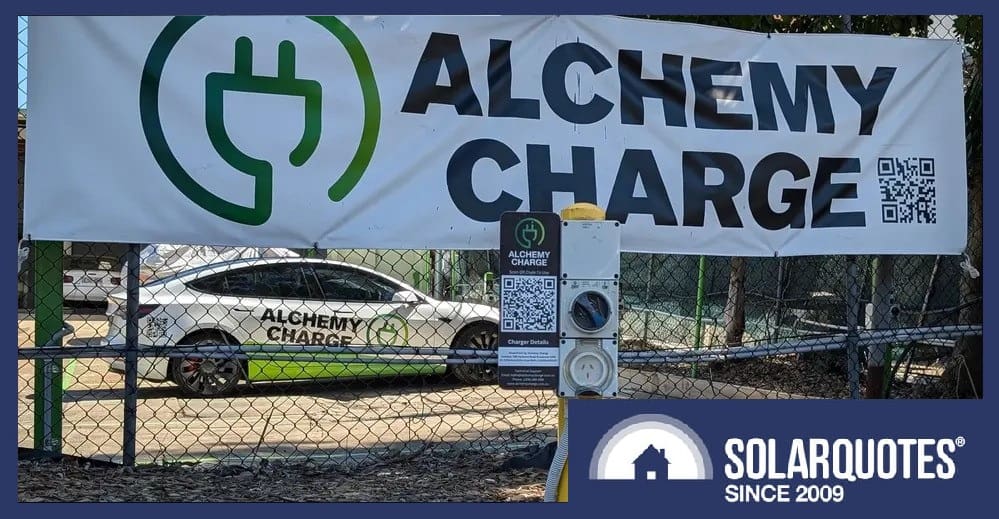
As a former apartment owner, I understand EV owners’ frustration when their strata committee rejects requests to install charging points in their car parks. For many apartment dwellers, this seems like an insurmountable roadblock to EV ownership.
But what if you didn’t need to ask for major infrastructure changes at all? Enter Alchemy Charge, an Aussie startup with a simple solution: their SmartPoint turns an ordinary power outlet into a smart EV charger.
Could this be the breakthrough apartment EV owners have been waiting for?
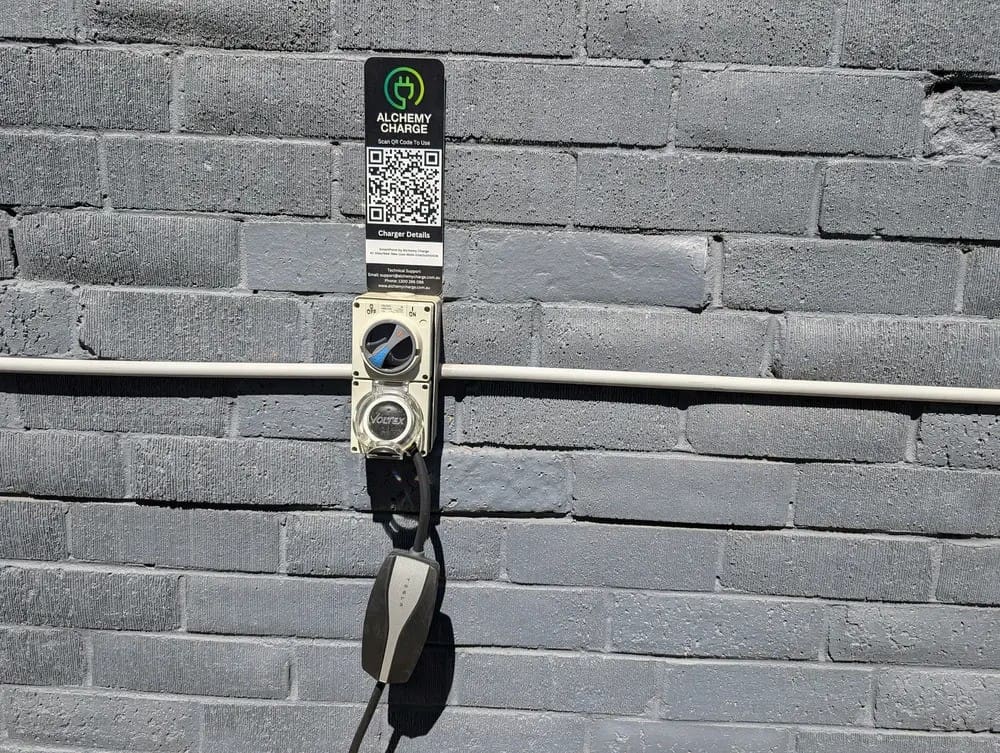
The SmartPoint changes ordinary power outlets into EV charging stations.
SmartPoints – No Wiring Upgrade Required.
Alchemy Charge’s SmartPoint is a ‘smart’ 10 amp powerpoint that meters the kWh used and then bills the car’s owner appropriately.
If the SmartPoints replace existing power points, no extra wiring is required. If new power points are required, the installation cost will be lower than running special 32-amp circuits for standard AC chargers.
But Charging Speed Is Limited
The downside is a your charge rate is limited to 2.4 kW compared to a typical 7kW dedicated charger. Also – if multiple EVs need to charge at the same time, each SmartPoint may require its own circuit.
Neil Finally Gets EV Charging
I spoke with Strata apartment owner Neil who told me he’d tried for 4 years (Neil is a patient man!) to get EV charging enabled in his apartment complex parking spot.
After he heard about Alchemy Charge he mentioned it to his strata committee. When they understood no expensive building electricity infrastructure upgrade was required and Neil was asking to install a smart normal power point, getting committee approval was easy.
Before paying to have an Alchemy Charge SmartPoint installed, Neil had publicly charged his EV for 18 months. His EV charging costs have now halved compared to using Fast DC Superchargers, and he’s regained 1-2 hours/week previously spent waiting at public chargers.
Neil is certain more Alchemy Charge SmartPoints will appear in his building soon, as other EV owners wish they had his convenient charging solution.
Alchemy Charge Tested On MG4
I recently drove my MG4 77 EV to the Northern Beaches of Sydney to visit Alchemy Charge’s headquarters to try out the established 2.4kW SmartPoint with my own car.
Both use standard 10 amp 2.4KW power connections, a specification that proves both a strength and limitation.
While it enables installation in virtually any location with standard power infrastructure, the relatively low SmartPoint power output means much longer charging times compared to higher-powered 7kW alternatives.
Some EV owners may want to charge more rapidly because they have a long commute or simply want the peace of mind of knowing they can charge their EV every night to 80% (NMC battery) or 100% (LFP battery).
Is 2.4 kW Enough?
Most Australians drive well under 45 km per day, and a 2.4 kW charge rate easily replenishes the energy used.
When I tested SmartPoint the app said it was supplying my MG4 with a 2.22kW charge rate at 229.3V. The Carscanner Pro app analysing my car statistics via an OBD reader said the car was receiving 1.87kW charge rate, a loss of about 16%.
This would add about 22 kWh to an EV if it was plugged in for a 12-hour charge. That’s an easy 100km of driving range.
Installation
Any electrician who can install a powerpoint can install a SmartPoint. Each unit arrives pre-configured and tested.
Rather than installing EV chargers in shared parking bays, which they say can lead to resident disputes and scheduling conflicts, Alchemy Charge supports individual installations as residents request them.
Hotels, Motels, AirBnBs
SmartPoint could be useful with hotels, Airbnb, and other short-term rental properties, where individual charging points align well with property management requirements for simplicity of use and low user support needs.
I’ve stayed at a few motels where the owner regrets getting a “dumb” EV charger that results in wasted staff time keeping track of kWh used, calculating and collecting user payments, or just losing revenue in bigger electricity bills.
Costs
The SmartPoint comes in two variants: a WiFi-enabled model at $399 and a mobile data 4G version at $499 (plus monthly SIM fee).
Alchemy charge a hefty $0.10 per kWh commission.
App, Payments, Reporting & Admin
User interaction with SmartPoint is the Alchemy Charge app. While QR code scanning capability exists, the company actively discourages its use due to security concerns, citing documented fraud cases in European markets.
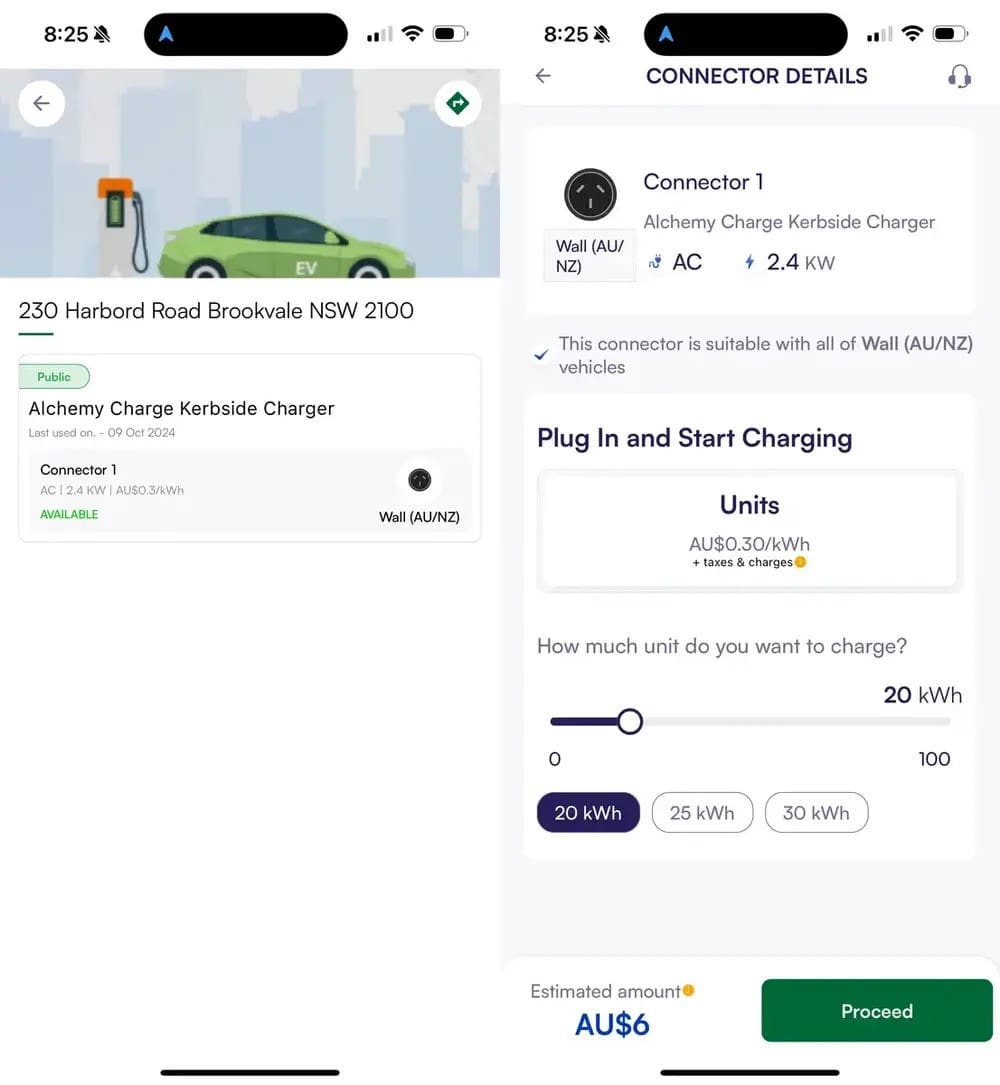
The Alchemy Charge app is available in the Google Play Store and the iOS App Store.
Payments are processed only through PayPal. If you prefer using RFID cards, phone tap-and-pay, or saving your credit card details in an app, you’re out of luck.
Session tracking and expense management are by email, providing expense claim documentation for novated lease users.
Breaking Down Barriers to Apartment EV Charging
Anything that makes EV ownership more accessible for apartment dwellers is a step in the right direction. Alchemy Charge’s SmartPoint may not suit every scenario, but for EV owners who drive under 100km per day, it could be the solution they’ve been waiting for – if they can stomach the 10c per kWh commission.

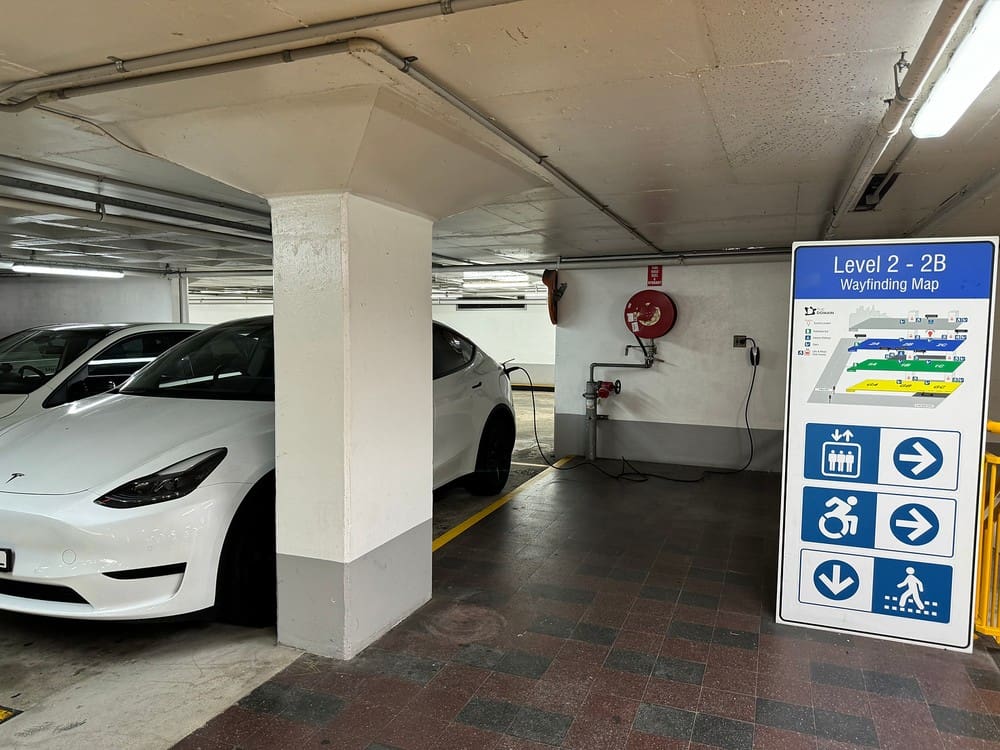
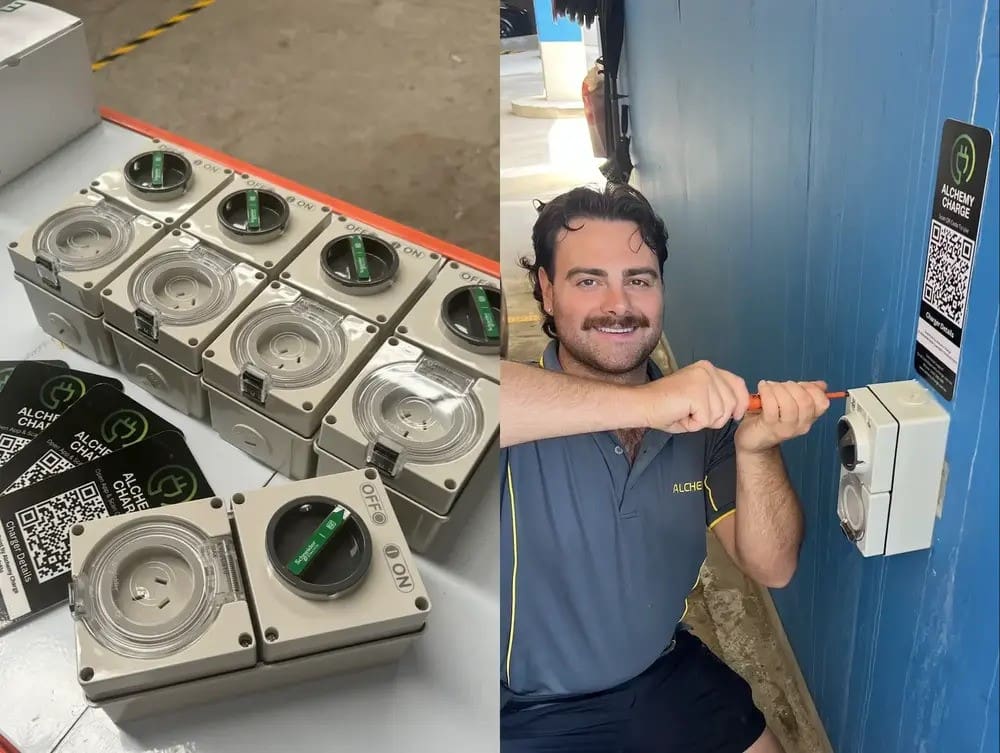
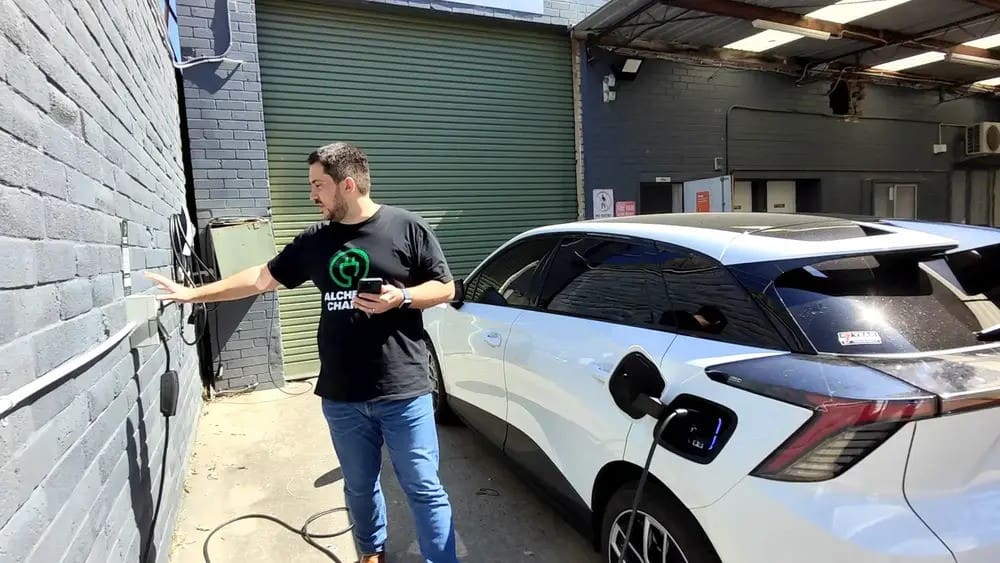
 RSS - Posts
RSS - Posts



And even if you drive more than 100km/day, you’d have to use a public fast charger far less often.
You say “User interaction with SmartPoint is the Alchemy Charge app. While QR code scanning capability exists, the company actively discourages its use due to security concerns, citing documented fraud cases in European markets.”
I assume you mean Alchemy doesn’t recommend using its app to scan other QR codes. I.e. to only use it for their own SmartPoints and not for general QR scanning?
The problem with QR codes for payment is scammers putting a sticker over the official QR code that redirects to a spoof website that takes your credit card details…
Understood Finn. So the QR code isn’t actually necessary, you just pay via the app.
I’m an apt dweller, and following concerns about me (level 1) charging my car in my garage car space, I’m currently waiting to hear back from our building insurer to check that the building policy covers charging an EV. While it’s wise to check, the anti-EV hysteria brigade are whipping up anxiety and misinformation in the community.
I would imagine this could be used at a workplace or public car park as well? These units should be a game changer, often there is capacity available but no way to bill.
Our last strata building governing board decided a few years ago that they would revisit the question of EV charging along with rooftop solar, in 2030. And not before, so that was a factor in choosing to move elsewhere.
We had no trouble just running a cord from our patio, but ideally the plugs should be in the underground garage so residents on all floors can use them.
From their web-site
“User-Pays
Users pay for usage at the rate you set, plus our 10 cents per kWh commission, with funds going back to the host monthly.”
On top of a $0.28 kWh charge https://www.alchemycharge.com.au/strata then add a $0.10 or 40% extra charge. A bit of a touch up if you ask me!
Useful article Neerav, but your line here is a head scratcher:
“There are no ongoing fees for SmartPoint WiFi units. However, this did make me wonder how Alchemy Charge funds the app and platform long-term if Wi-Fi SmartPoint users don’t pay anything to contribute to the backend cost.”
This is no mystery as 100% of their 10c/kwh ‘commission’ goes back to Alchemy, as clearly stated on their website: “The funds are paid back to the hosts bank account less our commission.” https://www.alchemycharge.com.au/strata
I agree with #torrobber, 30-40% surcharge is pricey and a deal-breaker.
Hi Big Rob
Thanks for pointing that out, I’ve asked the SQ blog team to amend those sentences
I misunderstood Alchemy Charges explanation to me about pricing when I visited their HQ.
I thought they didn’t take a 10c commission per kWh if the charger was set to “free” (if exclusively used by the owner as in the case of Neil the guy in strata). Turns out that was incorrect
I’ve updated the blog – I am tempted to change the headline to “Alchemy Charge Like A Wounded Bull!” 10c per kWh is excessive IMO
Whether 10c/kWh is excessive depends on the usage. Most of the other billing operators seem to charge a monthly fee per charging point of $25-40/month.
So the crossover point (on a 166Wh/km car) would be between 18000 and 30000km a year charged at home, and noting that many EV drivers will also use alternate chargers on longer journeys.
So I don’t think it’s excessive for an individual user versus the alternatives. Probably would be for a shared point with high usage.
The building / condominium association might be charged a lower rate than each resident pays, so that additional $0.10 might not work out to much more than they’re paying to run the stove.
And definitely it’s much less expensive and more convenient than public DC chargers.
Tesla charges $0.75 CAD for fast charging here, probably because of ‘demand’ charges, vs. about $0.25 for residential plus delivery.
The wholesale generator rate is $0.09, so the $0.16 between is the utility’s charge for the connection and the meter.
The irony with strata rejecting a dedicated 32A wall charger on ‘safety’ grounds is that a wall charger will be much safer than a plug outlet. Its difficult to police what gets plugged into a wall outlet, it could be anything bought from Temu, in poor condition, or connected with an adaptor. There’s also no load management if multiple outlets are powered from the same circuit.
SmartPoint has active protections like over amp, watt, voltage and a heat protection mode built in.
Because it’s a managed internet connected service there is a queuing feature and load management as well
From the last Sydney EV show where they had a stand, also worth looking at ReadySteadyPlug.
Similar idea in that they use 10A plugs but seemingly more scalable and with more robust load management systems.
Price wise I got the sense their solution would be more expensive than Alchemy, but a lot cheaper than the managed 22kW AC solutions.
From memory that competing product has a substantial several thousand dollar upfront cost so it’s hard to see Strata buildings taking it up
Versus what might be hundreds of thousands for a managed 22kW network however.
I’m just unsure how well Alchemy actually scales beyond a handful of points when you start getting into multiple load management scenarios (eg. On a single line, on a distribution box, and to the incoming feed of the complex).
Ultimately a total cost to both strata and the end user, in upfront costs, monthly fees or add-ons needs to be considered as well as whether the solution will support 5, 10, 50 cars etc.
Apartment dwellers are at such a disadvantage by comparison with house dwellers. As a house owner I’m on AGL’s night saver plan which lets me charge my EV (or use power for whatever I like) for only 8c/kWh between 12 and 6am. And I have excess solar power during the day that I only get 6c/kWh to feed in so may as well use for charging at an effective cost of 6c/kWh. A simple iPhone shortcut automation turns the charging on and off at the right times overnight and relative to sunrise and sunset. That gives me plenty of time to top up the car each day. But adding a 10c commission would more than double my charging costs!
Just a correction so that people understand what they are actually saving. If you have excess solar at a feed in of 6c and you use that to charge your car or for any other purpose you are not saving 6c. You are actually saving what the actual grid price is at the time you are using your excess solar, which is usually more than the feed in.
In WA very easy, have an enphase roof of 13 kW, so obligated have to feed in 1.5 kW but get no money. My only solution to not enrich the power companies any further is to charge my EVs to the hilt and use further excess power to cool down rooms very deep where I do not come or heat the u used pool in summer.
Victorians can appeal body corporate (formerly known as body corporate) decisions. The Owners Corporations Act 2006 outlines a process for handling complaints and resolving disputes. Here are the steps:
Internal Complaints Process: The first step is to use the internal complaints process set by the owners corporation.
Dispute Settlement Centre of Victoria (DSCV): If the internal process doesn’t resolve the issue, you can take the matter to the DSCV for mediation.
Victorian Civil and Administrative Tribunal (VCAT): If the dispute is still unresolved, you can apply to VCAT for a formal decision.
I think the next important step is going to be multiple charge points where cars are parked while people are at work. Workplaces, public car parks, train station parking areas etc. Like these Alchemy points, 10amp outlets would be enough, but enough of them (and gradually increasing numbers) to allow an EV to sit all day while the owner is at work.
This will enable EVs to soak up the abundant excess solar generation in the middle of the day.
Absolutely David,
This won’t be as expensive as “full blown” 7kW charging but will serve the purpose admirably.
Basically anywhere cars are parked during the day, there needs to be a GPO to plug in 2kW so you can pick up 12km range per hour.
Take that energy home to cook tea & make breakfast as well.
The DNSPs are banking on it, otherwise we’ll need a ludicrous overbuild of infrastructure, especially in the low voltage distribution to houses & businesses.
Just think of how many EV sales will be driven by seeing *every* parking bay now has a plug.
My mums only 2 years old apartment did not have one power point in the garage for the whole 50ish tenants. It blows my mind this could get past all the regulations and get approved in the 2020’s. Especially as they were using the car lift system that needs power to every car lift anyway. Beyond stupid.
This is just public charging of the slow variety. It does not allow the EV owner to control the market cost of electricity based on their electricity contact, and therefore is not a cheap option for Home charging. It does give some flexibility, however.
Would be good to see a 15A product – often 10A is not enough to top up overnight, especially in motels and accommodation where a car arrives with a lower state of charge.
A 15A outlet requires a dedicated circuit from the switchboard, but if a new circuit is to be installed for the outlet regardless then there won’t be a significant cost difference between setting it up for 10A or 15A.
This also assumes the car charger comes with a 15A tail to take advantage of the extra power – I know Teslas have this, not sure about other makes.
Powerlog Pty Ltd also has a strata charging solution, see powerlog.com.au It is a different model to other solutions. Powerlog is based in Melbourne , however has installation capabilities in most capital cities.
This is granny charger speed, so for most people pretty useless. I find a 10 Amp connection for 2.4 kW for 399 or 499 $ pretty expensive and to be honest the surcharge over what you pay the power conpany to the producer where you buy this expensive device from, 10 cents/kWh a complete rip off.
You have not mentioned whether this is one phase or three phase.
I also do not underatand why strata allow this device, which I find a bit of an eyesore and not a neat square, maybe slightly larger box.
For me, there is no need for this snail charger.
Hi Johan,
For the majority of people a simple type 1 charger is all they need.
https://www.solarquotes.com.au/blog/ev-charging-power-outlet/
Please try and keep it civil kids, you can ask have a say but please don’t make the moderating task difficult. Admin.
You clearly do not have an EV or live in an apartment, I would give my left nut to be able to charge in my apartment using this, instead I’m paying 80 cents at the public superchargers so how exactly is this a rip off? I would end up paying less than half!
10 cents/kWh commission shows greed by the company and on principle, I do not support a company that is greedy, especially seeing that this is an opportunistic device rather than an innovative one developed by the company.